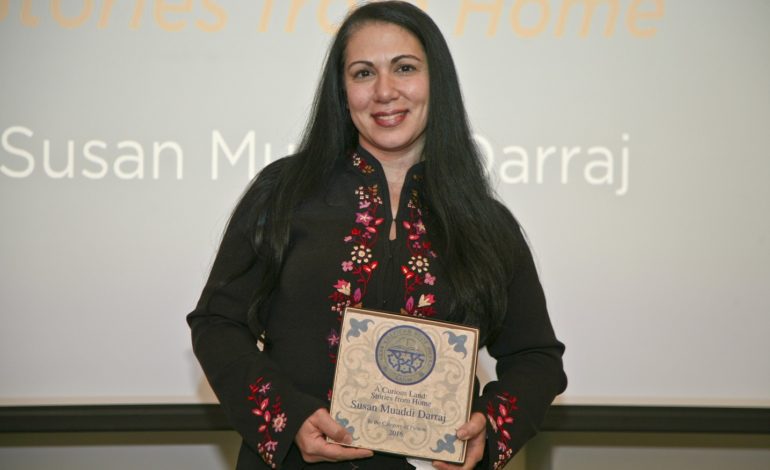BALTIMORE —Author Susan Muaddi Darraj intersects her identities as a Palestinian and as an American to tell stories from the “third space— the space between two cultures” that ultimately shapes the characters involved in her tales.
According to Darraj, there are so many stories that could be told about the Palestinian immigrant community, but there’s always an inhibitor that reproaches her in a way.
“It’s like I have a voice chiding me, ‘Write positively about our community,'” she said. “But, of course, our community had its problems, as does every immigrant community. So the key is probably to be balanced.”
As for Arab women’s experiences, Darraj has felt the need to dispel misconceptions that revolve around their identities.
Growing up, she never recognized the Arab women whom mainstream media seem to only portray as “oppressed and silenced.” They seemed unfamiliar. Instead, she was captivated by women like Hanan Ashrawi, a Palestinian legislator, activist and scholar, whom she remembers seeing as the “first positive image for Arab women” in the news.
“I was drawn to her because she represented the Arab women in my own life,” Darraj said. “She was smart, articulate, passionate.”
However, even though Darraj writes about Arab women, specifically Palestinians, she said she cannot be a representative for all their experiences.
“The Palestinian women carry so many burdens, both those who live in the diaspora and those who are in Palestine,” she said. “I don’t want to be a spokesperson for Palestinian women’s experiences. I cannot do that, but I can write about my own experiences growing up and living in the United States, where so little is known about Palestine— despite our government having so much influence in the region.”
Darraj said to be Palestinian is “a political identity, whether we like it or not.” So, as a writer, she gets to “bridge [her] reality of being Palestinian with other people’s ideas and/or misconceptions of that identity.”
The Philadelphia-born, award-winning author also aims to highlight Palestinian women’s vital role in the history of Palestine to date in a picture that is “more complete, more rounded, than the one-dimensional depiction we have now.”
She said her determination to become a writer emerged from her love of reading as a child— in essence, reinforcing the importance of reading to writers.
Darraj recalled how lots of books moved her and affected her in diverse ways at various stages in her life.
“I found ‘The Bronze Bow’ to be a marvelous book,” she said, adding that other childhood favorites included the “Anne of Green Gables” books, “Nancy Drew”, “The Hardy Boys” and the “Sweet Valley Twins” series.
When she grew older, Darraj found inspiration in African American writers like Alice Walker and June Jordan.
“[They] were very influential on my writing,” she said. “They expressed what it was like to be in America and to be an insider and an outsider all at once. They also write passionately about what it was like to feel like you were not in sync with your own community…. this is something that really struck me.”
And so, Darraj began to write about existing in the “the space between two cultures.”
In 2015, her short story collection, “A Curious Land: Stories from Home”, was published by the University of Massachusetts Press. It won the 2016 Arab American Book Award, a 2016 American Book Award and was shortlisted for a Palestine Book Award.
“My [story collection] is a fictional ‘village book’ about Palestine,” Darraj said. “…Many Palestinians are documenting their villages, which were lost due to the military occupation. One of my characters is writing a village book about the two, Tel al-Hilou, and my book is itself a history of this town and its inhabitants. I write several stories, which link together to tell one larger narrative, and the stories span almost 100 years of Palestinian history.”
The University of Notre Dame Press published her preceding short story collection, “The Inheritance of Exile”, in 2007. Darraj also edited “Scheherazade’s Legacy: Arab and Arab American Women on Writing”, which was published in 2004 by Praeger Publishers. She co-edited with Waïl Hassan a volume for the Modern Language Association’s Approaches to Teaching World Literature Series on Nobel Laureate Naguib Mahfouz.
Also, she has contributed book chapters to numerous anthologies and collections. Other books she’s written include young adult biographies of Indira Gandhi, Amy Tan and Gabriel Garcia Marquez for Chelsea House Publishers.
In addition to being an author, Darraj is an associate professor of English at Harford Community College in Bel Air, Maryland and a lecturer in Johns Hopkins University’s masters in writing program. She said the best part about teaching creative writing is “seeing [her] students write their own stories, tell their own truths.”
“Everyone has a story to tell,” she said. “Whether you’re a veteran, a person of color, from a rural or urban background, whether your struggle is with mental health, physical disability, emotional trauma, identity crises — or an intersection or some or many of these things. Students feel able to write in my class in a safe space; they are free to experiment.”
Darraj advised aspiring authors to write anything they want and make a schedule for themselves.
“You’re not a writer until you write,” she said. “Join a writing group or take a class, through your local college or community center or online. Join a professional organization like the AWP (the Association of Writers and Writing Programs) and definitely join RAWI — the membership is free, and there are lots of people who can mentor you.”






Leave a Reply